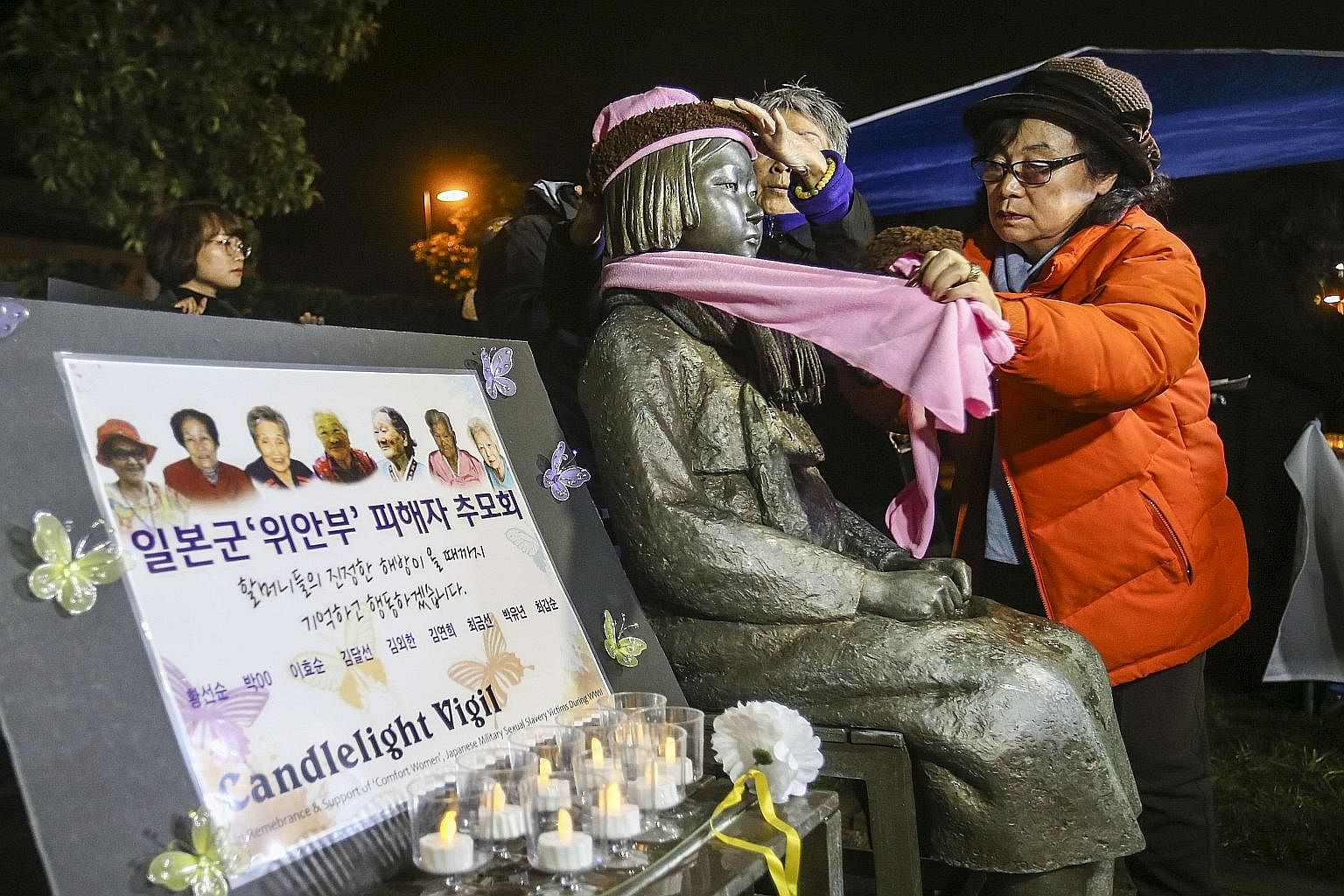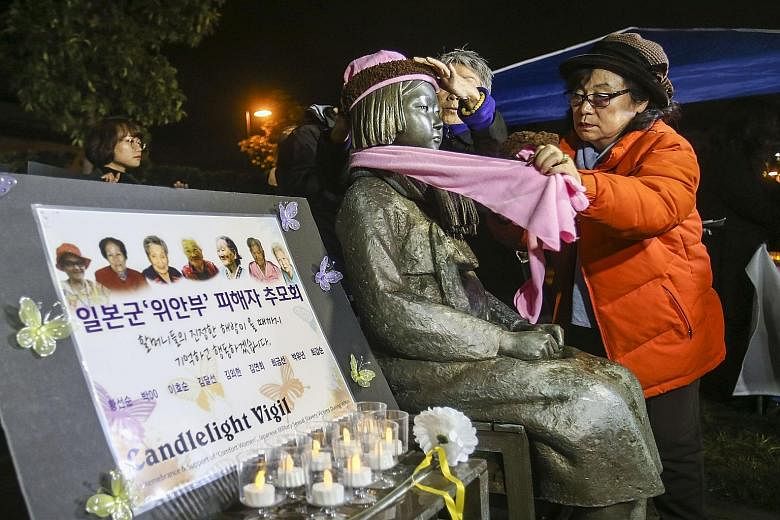BEIJING • Right after Japan and South Korea struck a landmark deal last month to resolve their dispute over the comfort women issue, the journalist in me thought of doing a feature on Chinese victims who were also forced into sex slavery by Japan during World War II.
Some online research quickly killed my plans. There were already more than 10 features with interviews of Asia's comfort women in recent years - with at least five published last year.
It shows these comfort women - a euphemism for females forced into Japanese military brothels in the 1930s and 1940s - have been eager to talk about their ordeal, which included being raped up to 50 times daily and suffering sexually transmitted illnesses.
About 40 per cent of victims, who number between 50,000 and 400,000 according to different estimates, committed suicide and only one in four survived the war. Many were rejected by their families after the war and remain ostracised by their communities.
Given their horrific and painful past, one can only guess that their main objective in retelling their stories is to obtain an unreserved apology and official compensation from the Japanese government.
They want their pain and suffering acknowledged, and for some kind of restitution to be made. Clearly, for these women, past "apologies" did not salve their pain.
It is a travesty of all that is moral and just, and these women have been disappointed time and again.

Like they are with the latest deal, which involved Japanese Premier Shinzo Abe expressing his "most sincere apologies and remorse" and a one-billion-yen (S$12 million) payment by Tokyo to a fund set up by Seoul for the 46 surviving South Korean victims.
In return, South Korea pledged not to use the issue to criticise Japan and also to explore the removal of a comfort woman statue outside the Japanese Embassy in Seoul.
But several weeks on, the deal has yet to be implemented after running into several roadblocks, particularly over the statue - a bronze figure of a teenage girl.
The Korean Council for the Women Drafted for Military Sexual Slavery by Japan, a civic group that funded the statue erected in 2011, has objected to its removal despite attempts by the South Korean government. A public opinion poll released on Jan 8 also showed 72 per cent of Koreans oppose its relocation.
The lack of progress on the statue reportedly led Mr Abe, in an interview last Monday, to hint that Japan's payment would not be made if South Korea could not keep to its pledges in the deal.
He also said in Parliament on the same day that the Japanese government "has not acknowledged the comfort women issue is a war crime" through the deal.
It is no surprise that the deal, which is supposed to be a "final and irreversible" agreement if both sides keep their pledges, would run into problems as it is widely deemed more a politically expedient agreement than a sincere expression of remorse by Japan to the victims.
This is because comfort women are reduced to bargaining chips for countries to advance their respective interests amid their geopolitical rivalry.
For South Korea, this is clear in how the government had brokered the deal unilaterally with Japan by excluding the surviving victims and by agreeing to settle the dispute irreversibly despite knowing their full demands are not being met.
In other words, the South Korean government appeared to care more about the leverage the comfort women issue gave it than the feelings and sufferings of the women themselves.
The women who suffered such state-sanctioned and repeated sexual assaults during the war also want ongoing education and building of memorials to commemorate the victims and preserve history; and prosecution of the criminals responsible for the crime, among other things.
As for Japan, its utilitarian approach to comfort women can be seen in the way Mr Abe, widely known as a historical revisionist, has changed his stance on the issue in the lead-up to the deal.
Critics pointed out that he did not raise the issue or apologise to the comfort women when he spoke at the United States Congress last April and in his statement last August marking the 70th anniversary of WWII's end.
Japan's stance has been that it had repeatedly apologised or acknowledged its responsibility over its war crimes. It also believes China and South Korea had waived compensation claims when they normalised relations with Japan and received its loans and developmental aid. Due to political pressure, Japanese leaders cannot be seen as making new apologies or compensation easily.
Mr Abe's change in stance to reach the recent deal was reportedly justified by the need to repair relations with South Korea so as to counter China's influence and also to exempt Japan's future generations from being held accountable for wrongdoings of their predecessors.
Comfort women once again merited policy attention only when there is strategic advantage to be gained from giving them some satisfaction.
For the US, the comfort women issue appears to be a chess piece to assert its influence in the region and to bolster its counter against North Korea.
Resolving the longstanding dispute between its two allies was key to achieving the two aims, which was why the US reportedly pressured both sides into the deal, according to reports in the Washington Post.
As for China, comments from Chinese activists suggest that the government may have not been as proactive as desired in fighting for its comfort women to get redress, so that it can retain a cudgel to use against Japan at expedient moments.
Some may say it is expected that the comfort women issue would be dealt with this way, given the political interests at stake.
But a line has to and can be drawn.The countries involved need to stop using the comfort women issue as a bargaining chip and work together to secure a fair agreement for the victims and their loved ones.
In fact, doing so might save the countries involved some headache, instead of defending the deal in vain and dealing with domestic backlash, like what they are doing now.
Professor Jeff Kingston, director of Asian Studies at Temple University in Japan, said the deal announced on Dec 28 "could easily unravel and become another bone of contention and trigger mutual recriminations".
"Prospects would have been better if they had negotiated a more substantive agreement and not missed the opportunity to advance reconciliation," he wrote in a Jan 9 commentary in the Japan Times.
"This would require launching a process and dialogue rather than disingenuously declaring closure concerning a past that cannot be neatly exorcised by fiat."
It is imperative that the world's leading powers take a stand on this to show that they do not condone this atrocity, amid reports of young girls now being used as sex slaves by the Islamic State in Iraq and Syria terror group.
Columnist Kim Myong Sik of the Korea Herald put it well in a recent commentary, saying "the phrase 'comfort women' should become the code word to wake up human conscience against atrocities done to weaker people by wicked state powers, and against injustices among ourselves".
This is possible only by giving the comfort women issue the due importance it deserves and resolving it properly so that the world sees sex slavery as a line that cannot be crossed.
One hopes, someday, these comfort women will be telling their stories not to extract an apology but to serve as a warning to mankind. But the prospect is dim, as time is running out, with the surviving victims now in the twilight of their lives.


